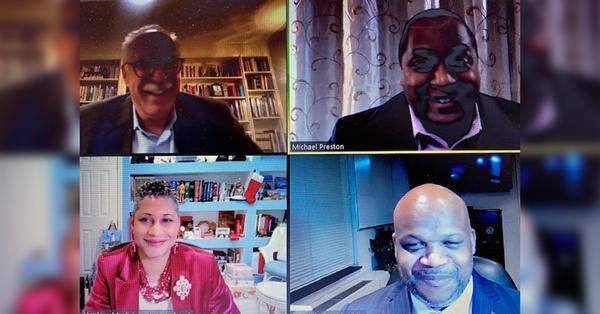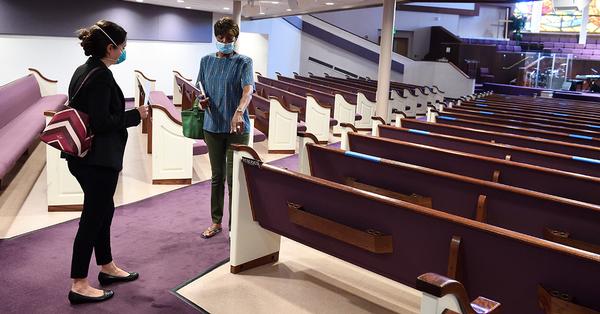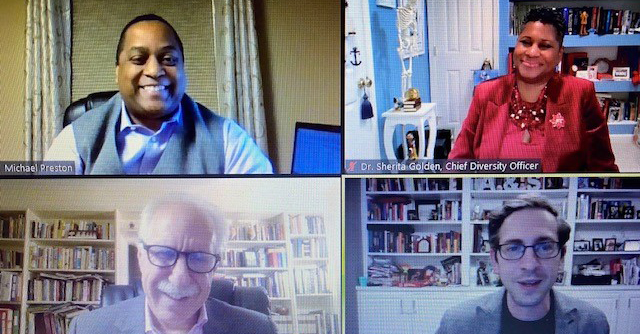Annual East Baltimore Community Conversation Highlights Listening, Learning
Panel discusses COVID-19 response, community connections

Paul B. Rothman, M.D., dean of the medical faculty for the Johns Hopkins University School of Medicine and CEO of Johns Hopkins Medicine, chats with Sherita Golden, M.D., M.H.S., vice president and chief diversity officer for Johns Hopkins Medicine; Branville Bard Jr., the vice president for public safety for all Johns Hopkins University and Johns Hopkins Medicine campuses and facilities worldwide; and Michael Preston, director of East Baltimore community affairs for The Johns Hopkins University and Johns Hopkins Medicine.
Members of the East Baltimore community attended the sixth annual East Baltimore Community Conversation to help foster open dialogue between Johns Hopkins Medicine and its neighbors. Due to the COVID-19 pandemic, the Jan. 12 meeting was held via Zoom.
The Community Conversation was hosted by Paul B. Rothman, M.D., dean of the medical faculty for the Johns Hopkins University School of Medicine and CEO of Johns Hopkins Medicine. This year’s meeting featured a panel discussion with Sherita Golden, M.D., M.H.S., vice president and chief diversity officer for Johns Hopkins Medicine; Branville Bard Jr., the vice president for public safety for all Johns Hopkins University and Johns Hopkins Medicine campuses and facilities worldwide; and Michael Preston, director of East Baltimore community affairs for The Johns Hopkins University and Johns Hopkins Medicine.
“2021 was another unique year,” Preston said in his opening remarks. “Though we had several effective vaccines, we still had to overcome many obstacles, including misinformation and mistrust, to keep our families, friends, colleagues and the community safe and healthy.”
Preston said Johns Hopkins Medicine has vaccinated more than 30,000 people at mobile vaccination clinics held at Baltimore senior housing facilities, schools, churches and community centers. Johns Hopkins Government and Community Affairs and its partners distributed 200,000 boxes of food to the community last year and provided backpacks, school supplies and personal protective equipment to students returning to school in the fall.
Before introducing Rothman, Preston shared a slideshow illustrating the work community leaders, The Johns Hopkins University and Johns Hopkins Medicine have performed to benefit Baltimore, particularly underserved city residents.
“We value the opportunity to spend an evening with our neighbors who are so dedicated to the community,” Rothman said. “You know, we call these ‘community conversations’ because we want it to be a conversation. It’s really an exchange of ideas.”
Rothman said there’s never been a more challenging time than the past two years. Johns Hopkins Medicine has performed more than a million COVID-19 tests since the start of the pandemic. More than 40,000 people have been diagnosed with COVID-19 during the pandemic, and about 10,000 have been hospitalized.
“In the past two years, we’ve lost over 150,000 Americans to COVID-19, over 12,000 Marylanders and almost 1,500 neighbors in the city of Baltimore,” Rothman said. “Many of us have lost friends and loved ones to the pandemic. For all of us, on behalf of Johns Hopkins, please accept our condolences for those of you who have lost loved ones. We grieve with you for that loss.”
Rothman said Johns Hopkins Medicine and The Johns Hopkins University strive to bring accurate and truthful information about the virus to both the community and the world.
“For a lot of reasons, we’ve been at the heart of the battle against the pandemic,” Rothman said. “Our teams in the field of infectious disease have been on the news multiple times trying to just tell the truth and the facts about the pandemic. These teams work tirelessly to try and get the right information to the public. That’s to say nothing about our teams in the hospitals who have been working tirelessly for two years to try and keep taking care of people.”
Rothman encouraged the group to wear a mask above the nose when inside around people, wash their hands regularly and keep their distance from others.
“I’m going to say again and again — get vaccinated and get a booster,” he added. “It does prevent you from getting sick and being hospitalized, and it strongly protects you from being in the intensive care unit.”
Rothman changed the tone of the conversation to share some exciting news about an important project. He said the Henrietta Lacks building is expected to be completed by 2025, and he hopes the building will be a beacon to bioethics and equality in medicine and science.
“It is as important to us as it is to you that minority and local businesses are sufficiently represented in this historic project,” Rothman said. He added that an advisory committee has been assembled to offer feedback and ideas throughout the design and construction process. The committee includes members of the Lacks family, Johns Hopkins University and Johns Hopkins Medicine staff, as well as East Baltimore residents and leaders.
“It will be a great addition, both to the medical campus and East Baltimore,” Rothman said of the building.
Rothman then introduced Golden, who shared some of the work that the Office of Diversity, Inclusion and Health Equity has been doing in collaboration with Johns Hopkins Government and Community Affairs to support the community during the COVID-19 pandemic.
“In the setting of COVID, we realized that it was critical that our efforts not only encompass what was going on inside of our hospital but also what was necessary care for our external community,” Golden said.
Golden said Johns Hopkins Medicine partnered with the Baltimore chapter of the NAACP to hire a sound truck that disseminated messaging about wearing masks, distancing and washing hands. When the vaccines rolled out, the sound truck broadcast information on how the community could get COVID-19 vaccines.
There was also significant educational outreach, Golden said. Johns Hopkins Medicine developed a COVID-19 vaccine equity website, for example, along with educational materials and a toolkit for community organizations. The toolkit has six handouts on various COVID-19 topics that are printable as PDFs in both English and Spanish.
Golden said a variety of virtual community town halls were held and attended by thousands. Johns Hopkins Medicine also partnered with Baltimore City to host a medical-religious virtual event that provided guidance on safely reopening houses of worship. The event was followed by in-person consultations at houses of worship, where Johns Hopkins experts answered important COVID-19 safety measure questions.
Johns Hopkins Medicine partnered with Urban One radio, Afro News, El Tiempo Latino and HeartSmiles, a youth enrichment and leadership development organization, to share public health information, particularly about vaccines.
“We developed specific messaging based on misinformation we were hearing in the community,” Golden said. “People aren’t going to come and get vaccinated if they don’t have the right information to make an informed decision. We wanted to get people’s questions answered.”
When Rothman asked Golden what the biggest challenge is about getting messages out today, Golden said pandemic fatigue.
“We’ve been functioning in this way for two years essentially, and after the vaccines became widely available, many of us eased back into our pre-pandemic function,” Golden said. “When winter came, we had to go back in and now we have this new variant. I think it’s a matter of not letting the fatigue of the present prevent us from being able to get through this safely. It’s important to incorporate safety practices and really limit your affiliations right now to prevent the spread we’re seeing.”
Golden encouraged the community to be flexible as public health experts learn new information and adjust recommendations.
“Recognize that Johns Hopkins Medicine has the best interest of the community at heart,” Golden said. “Let us know what you’re hearing. You are our boots on the ground. The reason we’re able to develop effective outreach strategies is because you all tell us what you’re hearing.”
Rothman then introduced Branville Bard Jr., the new vice president for public safety for The Johns Hopkins University and Johns Hopkins Medicine. Bard has 29 years of law enforcement and public safety experience, and Rothman called him “one of the country’s leaders in modern policing.”
“I’m thrilled to be a member of the Hopkins family,” Bard said. “It’s a responsibility I don’t take lightly. My goal is to ensure that we’re among the most professional organizations in the business and that our space feels safe and, at the same time, welcoming to everyone.”
Bard said it is ingrained in him to always be protective of the communities he serves, particularly with marginalized and vulnerable populations.
“You’ll find that I’ve been a strong advocate for police reform and progressive approaches in public safety that reduce harm,” Bard said. “I adopt strategies that focus on prevention, intervention and diversion over more punitive alternatives. I found that community trust comes much more easily when the community knows that you default to being protective.”
Bard said one can’t overstate the value of community engagement.
“My goal is and has always been to listen and learn from the members of the community,” Bard said. “Community engagement is vitally important because it’s part of the trust-building process. The only way to earn the community’s trust fully is to continue to show that you are worthy.”
Rothman concluded the presentations by discussing Johns Hopkins Medicine’s trauma response program, public schools and hiring.
Rothman said Johns Hopkins Medicine has invested in a program called “Break the Cycle,” which helps patients who come to the hospitals with a gunshot or knife wound and works to prevent those patients from becoming violent.
“It can be difficult to imagine the physical and emotional trauma of being shot or stabbed or living in a constant state of fear or vigilance,” he said. “That’s why we have a comprehensive program to address this issue.”
Rothman also discussed the Vision for Baltimore program, which was launched in 2016 to help improve the eyesight of Baltimore City students. He said the program has provided vision screenings to more than 64,000 students.
Rothman closed by describing how Johns Hopkins Medicine has made the application, hiring and onboarding process easier and how it has increased its marketing efforts to attract local talent.
During a question-and-answer session, Golden said Johns Hopkins Medicine is continually listening to the community.
“I hope we recognize that to deliver equitable care, we’re going to have to keep working with the community not just for COVID-19 but for diabetes, hypertension and heart disease,” she said. “We’ve shown that it can work.”


